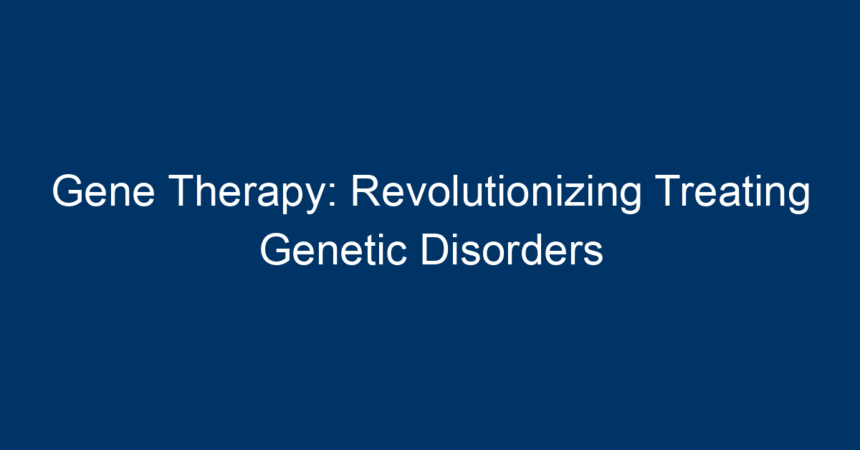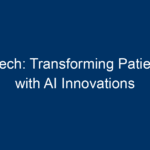Introduction
In recent years, the field of medicine has witnessed a remarkable transformation, one driven by groundbreaking advancements in biotechnology. Among these innovations, gene therapy stands out as a beacon of hope for patients suffering from genetic disorders. By correcting, replacing, or regenerating faulty genes, this pioneering approach has the potential to change lives in ways we could never have imagined. As we delve into the world of gene therapy, we will explore its mechanisms, applications, challenges, and the future it holds for treating genetic disorders.
What is Gene Therapy?
Gene therapy is a medical technique that involves altering the genes inside a patient’s cells to treat or prevent disease. It can be used to address various genetic disorders, including inherited conditions like cystic fibrosis and muscular dystrophy. By introducing, removing, or rearranging genetic material within a person’s cells, gene therapy aims to restore normal function or provide new capabilities to the affected cells.
Mechanisms of Action
Gene therapy predominantly utilizes two mechanisms:
-
Gene Replacement Therapy: This approach replaces a defective or missing gene. For instance, if a gene responsible for producing a critical protein is nonfunctional, gene replacement therapy delivers a healthy copy of that gene into the patient’s cells.
- Gene Editing: Techniques like CRISPR-Cas9 have revolutionized gene editing, allowing for precise modifications of the DNA to correct mutations at their source. This method can potentially fix genetic disorders by directly editing the genes involved.
Types of Gene Therapy
Gene therapy can be classified into two main types: somatic cell gene therapy and germline gene therapy.
Somatic Cell Gene Therapy
Somatic cell gene therapy targets non-reproductive cells, meaning that the modifications are not inherited by future generations. This type of gene therapy is currently the most common and has been successfully used to treat conditions like certain types of cancer and inherited diseases.
Germline Gene Therapy
Germline gene therapy involves changes to reproductive cells (sperm or eggs), which means any modifications can be passed down to offspring. While this type of therapy holds immense potential, it raises significant ethical concerns and is subject to stringent regulations in many countries.
The Promise of Gene Therapy for Genetic Disorders
Gene therapy has emerged as a game-changer in the landscape of genetic disorder treatment. Its potential applications span a wide range of diseases, offering hope where traditional therapies have failed.
Cystic Fibrosis
Cystic fibrosis (CF) is a severe genetic disorder affecting the respiratory and digestive systems. Recent advancements in gene therapy have shown promising results in introducing corrected genes that can produce functional CFTR proteins, thereby improving lung function and overall quality of life for patients.
Muscular Dystrophy
Muscular dystrophy encompasses a group of genetic disorders characterized by progressive muscle weakness and wasting. Gene therapy has been employed to deliver genes that encode for dystrophin, a protein essential for muscle function. Early clinical trials are already demonstrating positive outcomes, paving the way for more extensive studies.
Hemophilia
Gene therapy has also made significant strides in the treatment of hemophilia, a genetic disorder that prevents proper blood clotting. By introducing a functional copy of the gene responsible for clotting factor production, patients can potentially achieve sustained levels of these crucial proteins, reducing the need for regular factor infusions.
The Challenges Ahead
Despite its immense potential, gene therapy faces several challenges that must be addressed to ensure its widespread adoption and success.
Ethical Considerations
As with any revolutionary medical technology, ethical concerns surrounding gene therapy cannot be overlooked. Germline gene therapy, in particular, raises questions about designer babies, genetic privacy, and the implications of altering human inheritance. Extensive public discourse and regulatory frameworks will be necessary to navigate these complex issues.
Technical Hurdles
While gene editing technologies have advanced rapidly, there are still technical challenges to overcome. Ensuring precise delivery of therapeutic genes to the right cells without causing off-target effects is critical. Additionally, the long-term effects of gene therapy need to be monitored and understood fully.
Cost and Accessibility
The cost of developing and delivering gene therapy treatments can be prohibitively high, potentially limiting access for many patients. Policymakers and healthcare providers must work together to create a sustainable model that allows for equitable access to these transformative therapies.
The Future of Gene Therapy
The future for gene therapy looks incredibly promising. With ongoing research, clinical trials, and advancements in technology, we are on the verge of a medical revolution.
Advances in Research
Research efforts are continuously exploring new delivery methods, such as nanoparticles and viral vectors, which can enhance the efficiency and safety of gene therapy. Ongoing advancements in gene editing tools like CRISPR-Cas9 are opening doors to more precise treatments.
Patient-Centric Approaches
As advancements continue, there is also a growing emphasis on patient-centric approaches. Genetic counseling and education will be essential in helping patients understand their options and make informed decisions about gene therapy interventions.
A Collaborative Effort
The intersection of academia, industry, and regulatory bodies will play a crucial role in shaping the future of gene therapy. Collaborative efforts will be essential to streamline research, share knowledge, and ensure that therapies reach those who need them most.
Conclusion
Gene therapy is more than just a novel medical approach; it represents a transformative leap in our ability to tackle genetic disorders. As we advance towards a future where gene therapy becomes mainstream, the potential to change lives is unprecedented. While there are challenges to address—ethical, technical, and socioeconomic—the momentum in gene therapy research and application holds immense promise.
Actionable Insights
-
Stay Informed: Follow updates in gene therapy research and clinical trials for new developments.
-
Consult Healthcare Professionals: If you or a family member is affected by a genetic disorder, consult with a genetic counselor or specialist about potential gene therapy options.
- Advocate for Awareness: Engage in conversations about gene therapy’s potential, supporting ethical and equitable frameworks to facilitate access.
By embracing this innovative technology while remaining mindful of the challenges it presents, we can collectively work towards a healthier future where genetic disorders are not just managed, but effectively treated.




